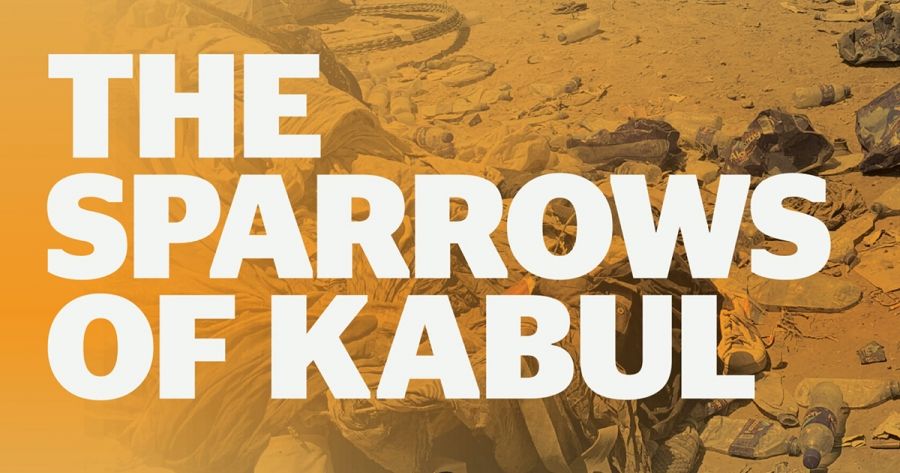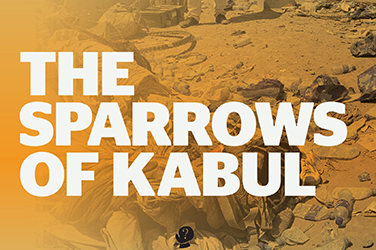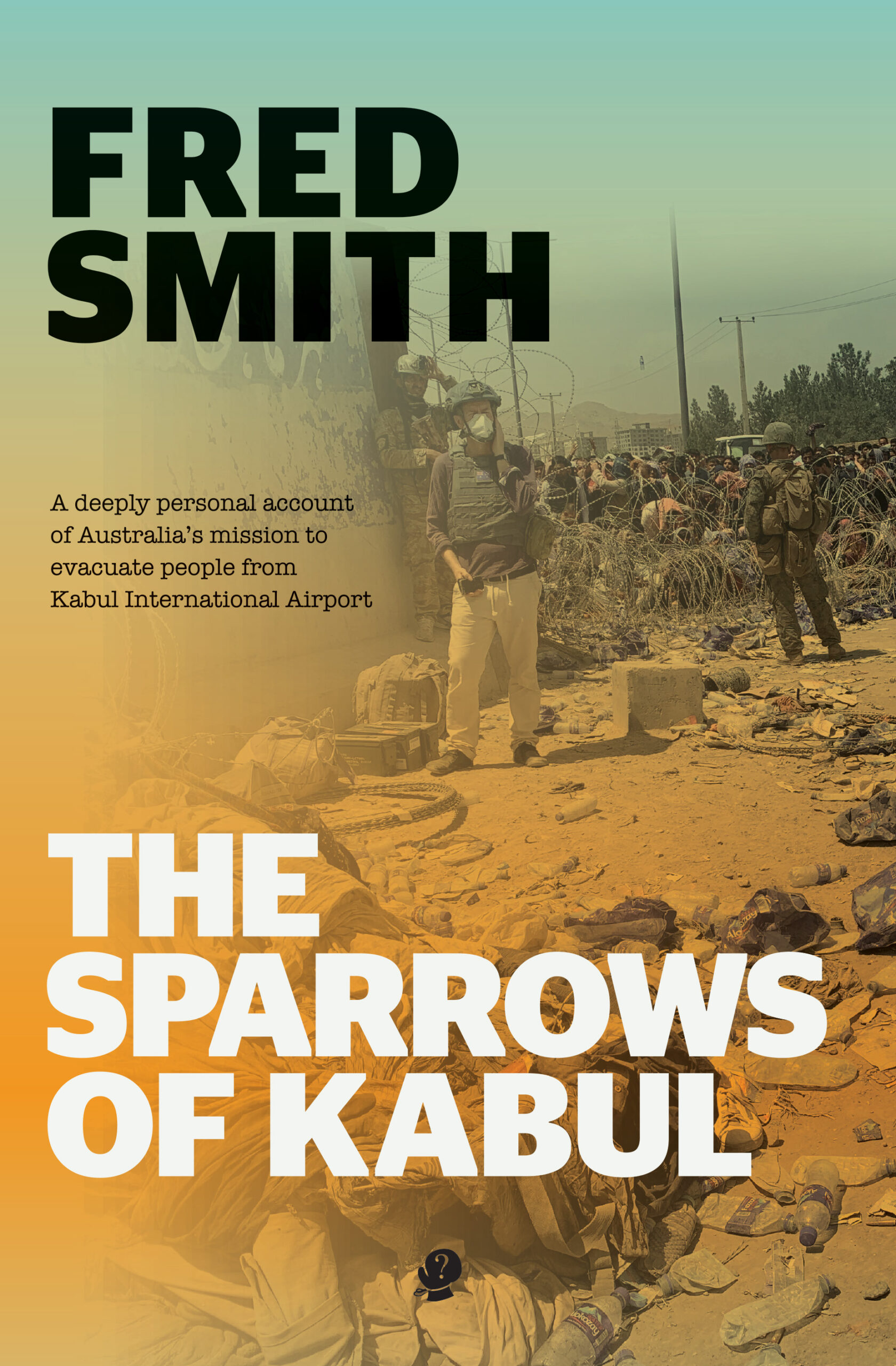
- Free Article: No
- Contents Category: Memoir
- Review Article: Yes
- Article Title: The Gate
- Article Subtitle: The terrible price of victory for the Taliban
- Online Only: No
- Custom Highlight Text:
Diplomat and musician Fred Smith’s memoir of his time with the Department of Foreign Affairs and Trade (DFAT) at Kabul airport, and later in the United Arab Emirates (UAE), processing Afghan evacuees fleeing the Taliban’s return to power in August 2021, opens with a richly symbolic vignette. On his first visit to the North Gate, one of only three public entry points to Kabul airport, Smith is confronted by a nightmare vision of the country’s collapse. Amid a cacophony of screaming and gunfire, thousands of Afghans jostle, push, and kick one another, waving passports, holding babies aloft, as they fight their way towards a narrow gap in the razor wire entrance to the gate, guarded by a human wall of US Marines. Every thirty seconds or so somebody squeezes through the scrum to safety, emerging discomposed, bloodied, and bewildered.
- Featured Image (400px * 250px):

- Alt Tag (Featured Image): Kevin Foster reviews 'The Sparrows of Kabul' by Fred Smith
- Book 1 Title: The Sparrows of Kabul
- Book 1 Biblio: Puncher & Wattmann, $32.95 pb, 253 pp
- Book 1 Cover Small (400 x 600):

- Book 1 Cover (800 x 1200):

As we all know now, despite promises of more enlightened rule this time around, the Taliban soon returned to fundamentalist form, imposing an extreme interpretation of Sharia law. Women were, once again, the principal victims of their theocratic medievalism. Within months, girls over twelve were banned from secondary education, while their older sisters, aunts, and mothers were excluded from universities, purged from public office, and driven out of the judiciary. All of which leads to the larger question – what did NATO and its allies achieve there?
For more than twenty years, Australian government agencies and NGOs strove to improve the lot of the people in Uruzgan, while the Australian Defence Force provided security for their operations. Smith was the first DFAT bureaucrat posted to support Australia’s mission there in 2009. His role was to foster closer relations with the province’s political leaders and community elders and thus smooth the ground for reconstruction and development projects. Smith, who had seven albums to his name by this time, wrote dozens of ballads during his posting, adopting the idioms of the men and women in uniform to describe for a public largely ignorant of the war the sacrifice and loss of ADF personnel. He recounted his adventures in this role, and the cast of colourful characters who illuminated it, in an earlier book, The Dust of Uruzgan (2016). Yet the deadpan jauntiness of the earlier memoir is signally missing from this one. Smith is a changed man.
The book’s title comes from a phrase he jotted in one of his notebooks during an earlier posting to the Australian Embassy in Afghanistan – ‘the sparrows of Kabul don’t give a shit’. Perhaps not, but Smith does. He is at pains less to justify Australia’s presence in the country than to illustrate the good faith with which the overwhelming majority of its people acted. The DFAT personnel sent to Kabul and the UAE to oversee the extraction of Australian citizens and those with visas certainly gave their all, physically and emotionally – Smith among them. Indeed, after only four days at Kabul airport his superiors pulled him out of the country to protect his well-being, sending him to the UAE, where those bound for Australia were processed for onward transit.
In part, it was the constraints of the job he loved that drove Smith to the edge. As a DFAT employee, he was bound by ministerial direction and the orders of his superiors, compelled to disseminate the cold official line when his instincts were to help wherever he could. Unable to apprise his many contacts on the ground, he had to stand by and watch as interpreters, security guards, fixers and their families who had served Australia in Uruzgan and Kabul, were left stranded by the mission’s unannounced evacuation from the airport and the country. At the same time, he had to tell others, some of whom he had worked with closely and come to know and like, that without the necessary paperwork to board a flight – though the eligibility rules shifted unpredictably – they and their families were on their own. It would have broken a harder man than Smith, who always wore his heart on his sleeve.
In The Dust of Uruzgan, Smith plays as many gigs as he fulfils official duties: entertaining troops, Afghan workers, locals, and assorted visitors with his wry, self-deprecating songs. On this occasion, his plans for a farewell concert in the UAE are stymied when he finds that his faithful guitar has fallen to pieces. The music is over.
Australians may have gone to Afghanistan full of good intentions, but their efforts were thwarted by political short-sightedness at home and the social and cultural conservatism of the society they sought to assist. The Australian government’s principal political goal in Afghanistan was to demonstrate its fidelity to the United States. As soon as the first Australian soldier touched down that mission was accomplished. From then on, governments led by both major parties made it up as they went along. The conviction that we could entrench a functioning democracy with attendant progressive values in a society governed by moral and social norms so distant from our own was as foolish as it was arrogant.
Did we do more harm than good? We helped oversee the education of a generation of Afghan girls and women. Yet most of them did not make it through the gate to the airport and now, with the return of the Taliban, are only too conscious of all that they have lost. Like Smith shepherding Raminah to temporary safety, many Australians cared deeply and did what they could to help, but it was too little and it could not last. In the end, after a glimpse at a life far different from her own, the girl had to go back to her family, and they to their country. It’s a good thing that Australians like Smith gave a shit. They paid a price for their readiness to help – but nothing like that being paid by those Afghans who, having struggled to build a new country, are imprisoned in the old.


Comments powered by CComment